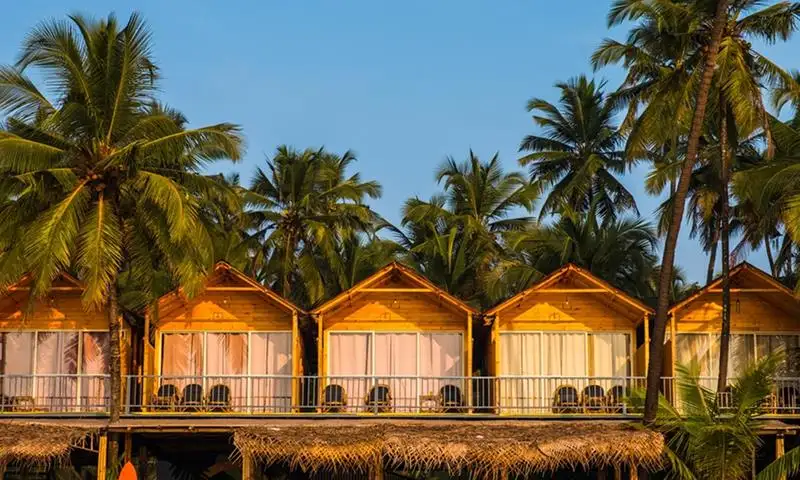
Imagine sipping tea grown right in the garden of your homestay, hearing stories of a sustainable lifestyle from your host, or waking up to the birds’ song in a forest lodge that runs on solar power. These are memories that stay with you forever, far richer and deeper than a fleeting hotel infinity pool experience. Eco friendly stays in India let you blend into the culture, connect with locals and truely live in sync with the environment around you. In India, a country with astonishing biodiversity and centuries old traditions of harmony with nature, eco friendly homestays are not just a trend but a natural extension of its cultural ethos. Memorable India brings this blog to highlight the reasons why these eco-friendly hotels and homestays in India are becoming new norms. Continue reading:
Eco friendly travel is about choosing a stay that is in harmony with its surroundings. It is a conscious choice where comfort does not come at the cost of nature. Let’s pause and reflect on why this matters so much in India.
From the Himalayan glaciers to the backwaters of Kerala, India has ecosystems that are under constant stress from over tourism. Eco lodges in India act as guardians of these lands ensuring minimum damage. These eco stays focus on practicing renewable energy like water conservation and waste management to lower their carbon footprint. Many properties run entirely on solar power and some use natural filtration to recycle gray water. This small shift makes a huge difference in safeguarding biodiversity.For instance, in Wayanad, Kerala, Banasura Hill Resort is built entirely with rammed earth, naturally regulating temperature without heavy use of electricity. In Spiti Valley, Ecoshpere’s homestays use solar-heated rooms and dry toilets for conserving scarce water. Such practices are vital for protecting delicate landscapes.
Many sustainable stays in India employ locals to provide them with employment opportunities and boost local economies. They also purchase goods and produce from nearby farmers and keep traditions alive. This means your travel money goes directly into uplifting communities. They also encourage the preservation of the traditional practices, art and crafts. This also ensures that you get a slice of the real culture and traditions of India not just the polished ones. Most of the homestays ensure that guests live with families, learn their traditions and contribute to household incomes. Some properties even fund local schools and women-led self-help groups.For example, when you stay in the Himalayan regions, you might share a cup of butter tea with a family while listening to stories about their ancestral farming practices. Guests are often invited to join in daily tasks. Similarly in rural Rajasthan, eco-friendly homestays give visitors the chance to learn about desert farming techniques, camel care and indigenous crafts like block printing. By choosing such accommodations, travellers are not just “visitors” they become partners in preserving a way of life that is both authentic and sustainable.
Organic meals, toxin-free spaces and natural surroundings contribute to both physical and mental wellness of tourists. Eco-stays across India are increasingly focusing on holistic well-being by creating an environment where food, air and surroundings are as natural as possible. You can enjoy the authentic local cuisines made with farm-fresh vegetables by the local farmers. The greenery everywhere takes you to another world that offers a more enriching and authentic travel experience. For city dwellers, spending even a few days in such places reduces stress levels. This also improves sleep quality and reconnects them with slow living.Imagine waking up in a Himalayan homestay. It offers freshly brewed butter tea, bread made from locally grown barley, and apricot jam from the orchard outside. Or picture yourself in Goa, eating a plant-based thali prepared with ingredients grown on the property’s permaculture farm. The food is cooked slowly, using age-old recipes that promote digestion and balance, allowing you to experience a meal as both nourishment and cultural immersion.
With climate change affecting weather patterns, water resources and biodiversity, the hospitality industry can also survive by becoming sustainable. So when you choose eco friendly stays in India with Memorable India, you are a responsible tourist and become a part of a larger movement for future generations. It is not just about your trip; it is about ensuring that your children and grandchildren can still see the snow in Kashmir, the coral reefs in Lakshadweep or the migratory birds in Bharatpur. Each eco-stay you choose is a vote for a greener future.For instance, the Andaman Islands are already witnessing the bleaching of coral reefs due to rising ocean temperatures. Eco-conscious resorts there have started coral restoration projects and limit water sports that damage marine ecosystems. This ensures that future travellers can still see the vibrant underwater world of the islands.
India offers a wide spectrum of eco friendly stays that cater to every kind of traveller. From rustic countryside retreats to luxurious eco resorts, these stays redefine comfort while keeping sustainability at heart. Here is the list of options for eco-friendly stays in India:
Eco lodges are nature inspired accommodations usually located in remote areas, forests or near wildlife reserves. They are designed to blend seamlessly with their natural surroundings while minimizing the environmental footprint. These stays are constructed using sustainable materials like bamboo, mud or reclaimed wood with a mission to minimise carbon footprints while providing a rustic yet comfortable experience. Most of the eco lodges today rely on renewable sources of energy like solar or wind power. They also recycle water or use rainwater harvesting to conserve resources for generations to come. Guests are encouraged here to participate in eco-activities like guided nature walks, birdwatching or learning about indigenous flora and fauna.
For example eco lodges in Kanha or Jim Corbett National Park offer wildlife safaris alongside eco conscious living where tourists experience luxury while staying close to nature. The meals in these lodges are often organic, sourced from local farms, reducing dependence on packaged goods. Staying here allows you to immerse yourself in biodiversity while directly supporting conservation efforts. They strike the perfect balance between comfort and sustainability, making them a top choice for nature-loving travellers.
Some Eco Lodges Are: Kanha Earth Lodge in Madhya Pradesh, The Machan in Maharashtra, Dune Eco Village & Spa in Pondicherry, Bandipur Jungle Lodges in Karnataka, and SwaSwara in Gokarna, Karnataka.
Activities to Do: Nature walks, hiking, wildlife safaris, birdwatching, cultural experiences with local communities, water sports and workshops on sustainability and conservation.
Key Highlights:
Farm stays are a growing trend in India’s eco-tourism sector. They offer tourists a chance to live on working farms while learning about sustainable agriculture during their travel journey. These stays emphasize the farm-to-table concept where meals are prepared using fresh produce grown on the property itself. Everything is sourced directly from the farm from organic vegetables and fruits to dairy products and herbal teas. Many eco farm stays in India follow permaculture principles. These principles ensure soil conservation, water efficiency, and natural pest control practices to preserve natural resources.
For instance, in Coorg or Wayanad, guests can stay amidst coffee plantations and enjoy locally brewed coffee along with organic meals. Beyond just food, guests can participate in farming activities such as planting, harvesting, feeding livestock and even learning about permaculture techniques. A farm stay is ideal for those seeking a detox from urban lifestyles and reconnecting with nature while learning about organic living. It is an enriching stay option for families, wellness seekers or anyone wanting to reconnect with nature.
Some Farm Stays Are: Philipkutty’s Farm in Kerala, Maachli Farmstay in Maharashtra, Himalayan Orchard in Himachal, Our Native Village in Karnataka, Wild Acres Farmstay in Tamil Nadu, Tathagata Farm in Darjeeling, etc.
Activities To Do: Animal feeding, milking cows, planting, harvesting, sunrise walks, birdwatching, pottery, weaving, painting, trekking, village safaris and local games, and more.
Key Highlights:
Eco friendly homestays in India allow travellers to live with local families in their traditional homes. They offer an authentic cultural exchange experience along with sightseeing. Travellers live here with local families often in traditional homes built with sustainable techniques like mud walls, wooden beams or stone. These stays emphasize sustainability by serving home cooked meals made from farm fresh ingredients and minimising plastic use. Unlike commercial hotels, homestays use fewer resources and operate in harmony with the environment.
For instance, homestays in Himachal Pradesh, Sikkim or Ladakh use solar heating, composting toilets and organic gardens that make them self-sufficient. Guests visiting in these stays get the chance to participate in farming, cooking or even local festivals. This fosters a cultural exchange that benefits both travellers and hosts. They offer both comfort and a sustainable way to travel for tourists looking for warmth, simplicity and meaningful human connections.
Some Home Stays Are: Olaulim Backyards in Goa, Thalathoor Heritage in Kerala, Bari Kothi in West Bengal, Sunnymead Estate in Shimla, Mayal Lyang Homestay in Sikkim, Bundi Vilas, Rajasthan, etc.
Activities to Do: Organic farming, seasonal harvesting, cooking classes, trekking, fishing, birdwatching, water activities, camel riding, pottery, village & nature walks, etc.
Key Highlights:
Heritage stays offer a unique blend of history, culture and sustainability. These are old forts, havelis, palaces or mansions that have been restored and repurposed into eco-conscious accommodations. These sustainable heritage stays in India breathe new life into historical structures rather than building new hotels. This reduces the construction waste and preserves the architectural legacy. Most of these properties promote sustainable practices like solar lighting, rainwater harvesting and organic gardening to balance luxury and nature responsibilities side-by-side.
For example, Neemrana Fort Palace in Rajasthan is a shining example of a restored heritage property. It offers eco luxury while preserving ancient architecture. Heritage hotels in Madhya Pradesh or Gujarat also employ local artisans for restoration work, keeping traditional craftsmanship alive.These accommodations also provide direct employment to the local community from cooks to guides. Guests can enjoy the royal style of hospitality, traditional cuisines and folk performances while knowing their stay contributes to cultural preservation. This ensures that tourism supports livelihoods. These heritage stays are ideal for travellers seeking to experience India’s rich past without compromising on modern sustainability principles.
Some Heritage Stays Are: Taj Lake Palace in Udaipur, Rambagh Palace in Jaipur, Taj Falaknuma Palace in Hyderabad, Brijrama Palace in Varanasi, Neemrana Fort-Palace, Rajasthan, and more.
Activities to Do: Heritage walks and village visits, folk performances, craft workshops, ayurvedic treatments, astronomical viewing, horse rides, storytelling sessions, etc.
Key Highlights:
Luxury eco resorts in India combine the charm of sustainability with the indulgence of high end hospitality. These resorts are built with locally sourced materials like bamboo, stone or reclaimed wood. They are designed to minimize their ecological footprint while offering world class comfort. These resorts integrate eco-friendly practices like solar power, water recycling, zero-waste kitchens and toxin-free architecture while offering five-star amenities.
For example, Coconut Lagoon in Kerala’s backwaters blends traditional Kerala architecture with modern eco-practices. It offers canoe rides, organic meals and Ayurvedic therapies. These eco resorts focus on holistic well being with guided nature walks, bird-watching tours, yoga, meditation and spa treatments. They understand their responsibility towards nature, so they employ locals, support community initiatives and invest in biodiversity conservation. Guests can indulge in comfort while knowing their stay is contributing to sustainability.By choosing these eco friendly resorts in India, tourists can enjoy a guilt-free indulgence that supports conservation efforts and empowers local livelihoods. They are the perfect proof that sustainability does not mean sacrificing comfort; it means redefining it for a greener future.
Some Luxury Eco Resorts Are: Banasura Hill Resort in Wayanad, Khem Villas in Rajasthan, The Tamarain Coorg, Mary Budden Estate in Uttarakhand, etc.
Activities To Do: Wildlife safaris, guided nature walks, birdwatching, ayurvedic spa treatments, yoga and meditation, forest bathing, kayaking, plantation walks, horse riding and eco-friendly craft workshops.
Key Highlights:
Eco friendly stays in India are a philosophy that takes you towards new levels of travel; sustainable tourism. They prove that comfort can coexist with responsibility and that travel can be about giving as much as taking. You rest, participate and preserve in a cycle of preservation, cultural exchange and sustainability by choosing them. So the next time you plan a journey, plan it with Memorable India. We have handpicked the top eco friendly hotels and homestays in India. Book with us as these resorts are ready to welcome you as homes, families and sanctuaries of nature. We offer eco concious itineraries that are a perfect blend of comfort, culture and conservation with our Eco-Tour Packages. Book your sustainable gateway with us today and make your travel truly meaningful!

15 Best Places to Visit in Ladakh That Will Leave You Spellbound
19 Feb 2026
15 Best Places to Visit in Ajmer, Rajasthan: A Complete Travel Guide
18 Feb 2026
12 Blue Flag Beaches in India: Where Pristine Shores Meet World-Class Standards
18 Feb 2026
11 Best Places to Visit in Meghalaya for an Ethereal Experience
18 Feb 2026
How To Plan The Perfect Family Holiday In A Budget
13 Feb 2026